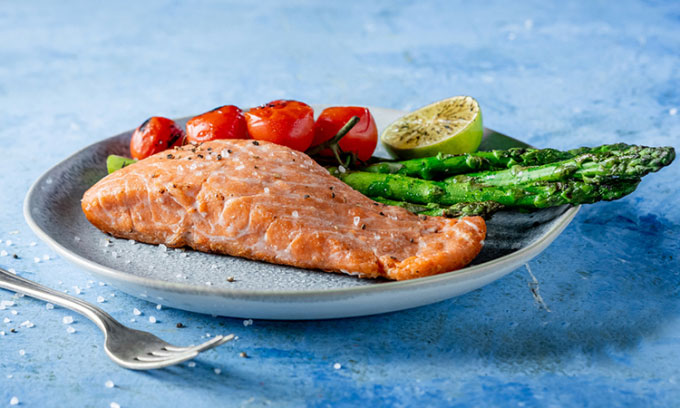Launch of the first artificial salmon meat from plants
Israeli food technology startup Plantish is on a mission to save the ocean through the development of artificially grown meat.
Plantish on January 13 announced a "vegan salmon loin" that mimics the look, texture and taste of real fish. It is made from bean paste, combined with algae oil and some other binders.
It also provides protein, Omega-3, Omega-6 and B vitamins, but does not contain the mercury, hormones and microplastics that can be found in ocean salmon.
The Israeli startup is teaming up with celebrity chef Jose Andres to serve their artificial salmon at select restaurants this year and aims to hit the grocery market by 2024.

Plantish artificial salmon meat dish.
"Plantish was founded to save the oceans, by reducing the need for marine animals by providing healthier, healthier and tastier alternatives. Our vision is to be the brand." the world's leading man-made seafood," emphasized Ofek Ron CEO.
Plantish creates vegan salmon tenderloins using 3D printing, a commonly used method for artificial plant-based foods. It allows to create tenderloins with fibers that mimic the texture of real food.
According to IMARC Group, the world's leading market research company, the seafood market is currently worth about 586 billion USD, of which salmon accounts for 50 billion USD. Overexploitation is threatening ocean ecosystems, pushing some species to the brink of extinction.
Environmental pollution is also making seafood contaminated. A 2020 study led by the UK's University of Exeter and Australia's University of Queensland found microplastics were present in all samples of seafood bought at the market, including fish, shrimp, crab, squid and oysters. , with sardines being the worst affected with microplastics content of up to 30 mg, equivalent to a grain of rice, per serving.
- Coming soon the world's first cheap artificial beef cake
- Artificial meat $ 330,000 to the oven
- There is an opportunity to 'enjoy' artificial meat
- Artificial meat 'crowned' next 2 years?
- Artificial beef will be available in the market: Breakthroughs for vegetarians because they do not want to kill
- For the first time there was a banquet with artificial meat
- Dishes from the lab
- The world's first artificial fried meatballs
- Launched the first manual manual for artificial food processing
- Startup Israel declared to make artificial steak, costing 50 USD / piece, tastes like real cow
- In Russia, there will soon be selling artificial meat
- The world's most expensive artificial meat tastes great
 The most famous scientific failures in history
The most famous scientific failures in history Mysterious genius mechanic and the machine froze time
Mysterious genius mechanic and the machine froze time The son carries the 'bad gene' of genius Albert Einstein
The son carries the 'bad gene' of genius Albert Einstein Isaac Newton
Isaac Newton